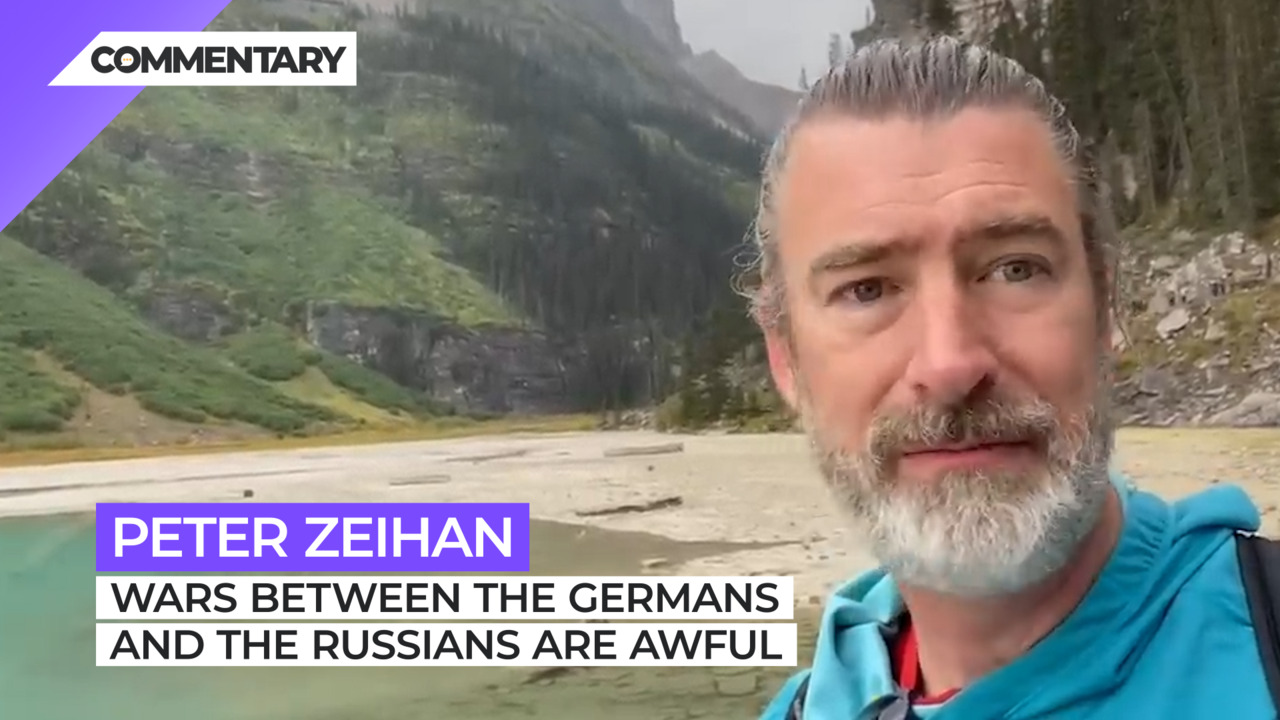
Commentary
-
Our commentary partners will help you reach your own conclusions on complex topics.
Hey everyone, Peter Zion here. Hello again from Lake Louise.
The news as of this morning is that the Germans have nationalized a couple of physical assets, refineries specifically that belonged to Russian state owned oil company Rosneft, multibillion dollar assets.
We’ve always known this was coming. As soon as you have the Germans and the Russians having a dispute over economics and strategy, they are going to start drawing lines. And this is one of the big ones.
Now, the German strategy for dealing with the Russians going back two centuries has been pretty straightforward. They want to avoid a war because wars between the Germans and the Russians are awful.
They fight in Poland, they fight in Ukraine, lots of people die, the weather is horrible. The terrain is wide open, they both commit atrocities. It’s just wretched. So they try to avoid it. And they do that by trying to entangle their economies. So they have a vested interest in not fighting. But ultimately, it doesn’t work out and then fighting and it’s horrible. Suddenly, to head to a tangle again.
What we’re seeing now is the disentanglement and the preparing for a direct confrontation. The Germans, of course, hope it won’t come to that. History suggests that hope is largely in vain. That’s the bigger strategic picture.
The economic picture is almost just as bold, because we have now had direct entanglement between the Europeans and the Germans for going on 30 years. And now that all becomes unwound.
So the Germans have fired the starting gun with some multibillion dollar assets they’re taken away from the Russians.
Expect every single joint venture that the two sides have and lots of property on both sides to basically be unwound and returned to the national authorities.
And that is the end of this phase of Russian European integration.
Don’t count on it coming back anytime soon, because the demographic pictures on both sides are just atrocious. So this is where it gets real. And this is where we have a sharp severing.
We’ll talk about what’s going on with the Chinese next.
-
Hurricane Helene hits US coast, Appalachia and beyond
Hurricane Helene hit Florida and Georgia overnight between Sept. 26 and 27 as a Category 4 hurricane, and accompanying storms will continue reaching deeper into the continental United States today. Dangerous flash flooding from the hurricane, known as storm surge, was some of the worst flooding that the Tampa Bay area has ever seen, and… -
Israel holds upper hand against Lebanon, Hezbollah and Iran
On Wednesday, Sept. 25, Hezbollah launched a ballistic missile at Tel Aviv in retaliation for Israel’s explosive pager attack that blew up devices across Lebanon. Although Israel’s defense systems intercepted the surface-to-surface missile, the attempted strike on Tel Aviv marked a significant escalation by Hezbollah. Since the siege on Gaza began, shortly after the Oct. 7, 2023,… -
The Sinaloa Cartel civil war
Fears of a civil war within the Sinaloa Cartel are growing as violence between competing factions within the cartel continues. The Mexican Army has dispatched around 600 elite troops to Sinaloa to help quell those fears, in addition to roughly 2,200 regular soldiers and National Guard. Watch the above video as Straight Arrow News contributor… -
New Ukrainian weapons hit Russia where it hurts
Ukrainian drones struck a major Russian ammunition depot, triggering a massive explosion that was captured on camera. According to the Ukrainian military, 2,000 tons of munitions had arrived at the depot before the attack. Over the past two years, Ukraine has significantly increased its domestic drone production, allowing it to scale up attacks on military… -
Weighing social costs vs. economic benefits on immigration
Global human migration is one of the defining elements of our current historical era, according to the United Nations. Migrants face both the incentives to leave — forced out by climate change, crime and corruption, extreme poverty or violence — and incentives for where to go, based on available job opportunities and so on. Migration…
Latest Stories
-
 Getty Images
Getty Images
US changes course, pauses tariffs for all USMCA goods until April 2
-
 AP Images
AP Images
More than half of global fossil fuel-related CO2 emissions linked to 36 companies
-
 Getty Images
Getty Images
Zelenskyy foes met with Trump camp, oppose wartime election: Report
-
 Getty Images
Getty Images
Trump preparing to sign executive order to begin closing Department of Education
-
 Getty Images
Getty Images
Fake bomb threat called during Pro-Palestinian protest at Barnard College
Popular Opinions
-
In addition to the facts, we believe it’s vital to hear perspectives from all sides of the political spectrum.
Latest Opinions
In addition to the facts, we believe it’s vital to hear perspectives from all sides of the political spectrum. We hope these different voices will help you reach your own conclusions.
The opinions published in this section are solely those of the contributors and do not reflect the views of Straight Arrow News.





















Latest Commentary
We know it is important to hear from a diverse range of observers on the complex topics we face and believe our commentary partners will help you reach your own conclusions.
The commentaries published in this section are solely those of the contributors and do not reflect the views of Straight Arrow News.
Dr. Frank Luntz
Pollster and Political Analyst‘Biased’: What Americans think of ‘mainstream media’
‘Getting rid of them’: Americans discuss Trump and immigration
‘Woke’: Why some Biden 2020 voters backed Trump in 2024